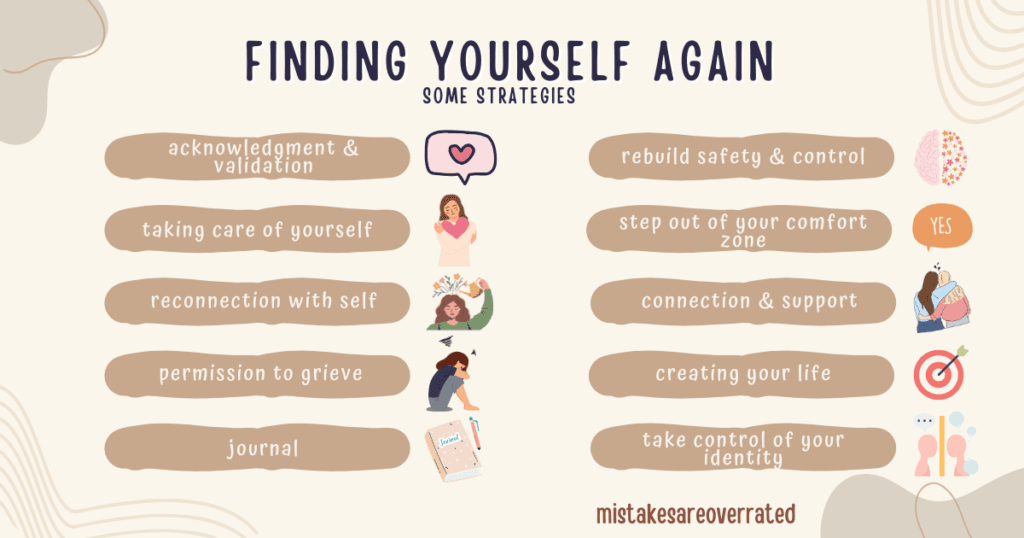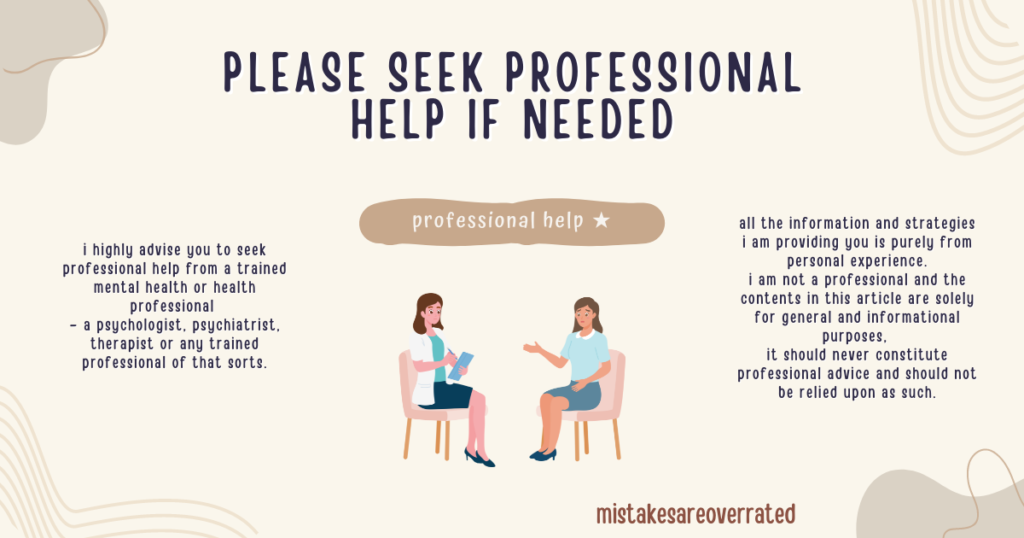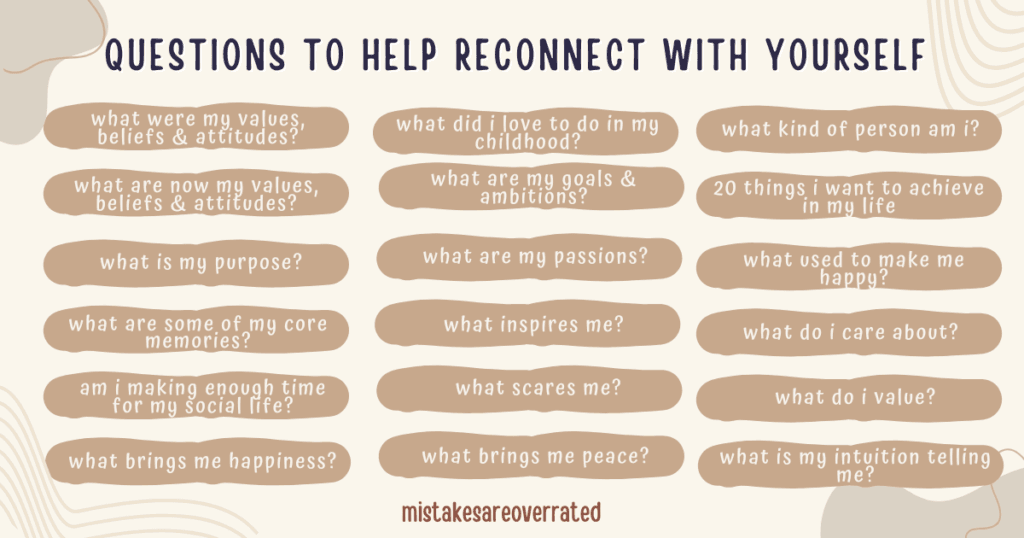life has a way of throwing us off course at times, but after experiencing trauma, sometimes it can feel like we’ve completely lost ourselves.
we can feel distant from the person we once were, the version of us who had big dreams, a purpose, and a clear sense of direction.
but healing is possible, and finding your way back to yourself, or creating a new self, is a journey.
it begins with understanding that feeling lost is not a permanent state.
think of it as an incentive for you to reimagine, rebuild, reinvent and reconnect with who you truly are, deep within your core.
we will explore steps to help you rediscover your inner strength, restore your sense of self, and begin your path to healing from within.
how to find yourself when you are lost

acknowledgment and validation
not feeling like yourself or feeling lost, i feel is such an unspoken topic, yet it is so so common.
as you are reading this, it shows you have acknowledged you aren’t feeling like yourself and are wanting to change this mindset.
acknowledging and accepting how you’re feeling is the first step in finding yourself again.
allow yourself to feel whatever you’re feeling without any judgment.
it is important to recognise that your feelings are valid, and that healing doesn’t mean ignoring, denying or suppressing your emotions and pain.
traumatic experiences can sometimes stir up a range of emotions we aren’t familiar with, from anger and loneliness, to confusion and numbness.
take the time to acknowledge what you have gone through as this is a crucial part of the healing process.
try not to minimise, avoid, or push it to the back of your mind, as your trauma will most likely still be lingering deep inside of you.
i turned to journaling and writing poems to help me express and acknowledge my trauma.
when you accept and sit with the emotions and feelings you’re experiencing, you are giving yourself the opportunity to work through them to rediscover yourself again ❤
taking care of yourself
you need to be doing what you love and what brings you happiness.
focus on engaging in activities that bring meaning, fulfilment and genuine happiness into your life.
these purposeful actions (doing what you love), no matter how small, can create a sense of momentum when healing through your trauma.
this can help you begin to find a sense of purpose, enjoy the life you live, and it can also be incredibly grounding.
the activities will be personal to you, but through these small acts, it can help you reconnect with your inner self.
i was able to reconnect with deep within my true self through meditation.
it took me a while, but with persistency i was able to learn to be still, mindfulness and reconnect with myself.
if my 100km per hour mind could learn to be still, then i have faith you can too.
but how do i find the things that bring me happiness when i don’t know?
reconnect with yourself
after trauma we can become disconnected from who we were and what we truly value or enjoy.
take time to reflect on who you were, who you are now and who you want to be.
make sure to think beyond the obligations in your life (work, ect), as this can help you rediscover your passions, or find new ones.
i recommend writing questions down, but you can also just think about them if preferred.
what used to make me happy?
think about the moments when you felt fulfilled, alive, blissful or excited.
what were you doing? where were you? who were you with?
what do i value?
think about and understand your core values, as this can be an indication to what might bring you purpose and fulfilment.
is it helping others? being active? social connection? creativity? adventures?
what do i care about?
think about what deeply resonates with you and is important to you.
health? family? a charity? sport team? education and growth? a business idea?
allow yourself to grieve
i had a misconception with grief, and perhaps you do too.
grief is not just a loss through death, grief can also stem from the loss of identity, trust, safety, or a sense of control.
after trauma it is important to allow yourself to grieve the person you were before the event, or the life you had envisioned for yourself.
(you may still have the same future plans for yourself after trauma, but in my circumstance, everything changed so i had to grieve my previous ambitions)
i must note that this process can, and probably will, take time.
just remember, there is no timeline or manual for how long your grieving should last.
what matters most is you’re allowing yourself to have space to fully feel the grief, without rushing yourself to move on.
be patient with yourself and trust that healing is possible, even if it doesn’t feel that way right now.
if you want to dive deeper into grieving after trauma – how to grieve in 13 ways, i have an in-depth article here for you.
journaling
i journaled almost everyday and found profound benefits from it.
it was fundamentally the basis of how i was able to find myself and discover the most significant parts of my life.
write down the most significant moments of your life – what has happened in your life that has shaped you to be the person you are today?
it is so sooo important to establish where you have been, in order to know the direction you need/want to be heading in.
by continually writing in your journal, you will see the progress you have made, your emotions felt, and most importantly, be able to notice patterns or scenarios that make you feel a certain way.
your journal should be your safe space, a place to let all your emotions out so you can release them, instead of suppressing them.
if you want to dive deeper into the powers of journaling and how to get started, i have an in-depth article here for you.
rebuilding your safety and control
trauma tends to leave us feeling extremely vulnerable and it can diminish our sense of control.
to open up and reconnect with yourself, you need to create an environment where you feel safe.
this is physically and emotionally.
physical safety and control – setting boundaries with certain people, or finding a peaceful space (the beach and sport was mine).
emotional safety and control – learning to trust yourself and others again, being open and vulnerable without judgement, and respecting your needs.
regaining control over your choices and environments can help you begin to feel more safe and grounded.
step out of your comfort zone
try to step out of your comfort zone more often.
this can help you discover who you are, the values you hold, and even find new attributes you may not have known about yourself.
this is because you will most likely be faced with obstacles you will need to tackle along the way.
and when you overcome these obstacles, you may discover new skills, values or goals you may not had known you had before.
stepping out of my comfort zone helped provide me with new perspectives, meaning and experiences in my life.
when i say get out of your comfort zone i don’t mean pack up your belongings and move abroad by yourself (unless thats what you want to do, then go for it).
stepping out of your comfort zone can be going for a walk in a new area, joining a new sport/hobby, or going to a new restaurant by yourself.
small steps lead to big dreams.
sometimes we need to remind ourselves that there is more to explore in our life and the world.
open up new possibilities for joy and purpose, and potentially create new pathways for you to pursue.
connection and support
as humans we’re social creatures, meaning we work in teams, we live in families and we thrive our best when we’re in the company of others.
trauma often isolate us, and can make us feel like we’re the only one who truly understands what we’re going through.
this can lead to the feeling of loneliness and a deeper sense of feeling lost.
i isolated myself for 6 months as i believed this, but then, i found healing thrives in connection.
– reaching out for support from loved ones or friends, speaking with a psychologist or therapist, talking to the police, joining support groups, ect.
please don’t pressure yourself to try and figure everything out all at once.
take small, manageable steps forward, as these can gradually lead to bigger changes.
the journey back to finding yourself is not a linear line, but with each step you take, it will bring you closer to the reconnection you need.
i highly advise you to seek professional help from a trained mental health or health professional – a psychologist, psychiatrist, therapist or any trained professional of that sorts.
all of the information and strategies i am providing you with today is purely from personal experience.
i am not a professional and the contents in this article are solely for general and informational purposes, it should never constitute professional advice and should not be relied upon as such.

creating your life and identity
i know that some things are out of our control, but to some degree, we hold so much power to create our own life.
we have the power to shape our lives by our reactions, how we think and feel.
i wholeheartedly believe my healing and finding myself, passions and life purpose, came down to my mindset.
create a lifestyle where you have purpose, feel fulfilled, feel healthy and you are actively working towards who you aspire to be.
when you know you’re benefiting yourself and working towards your dreams, it can create a sense of worth.
everyone has self-esteem, but this can be positively altered by becoming self disciplined and doing good for your body and mind.
sometimes we need to have a fresh start, especially if you no longer have the motivation to do the things you love.
(begin regular exercise, eating healthier foods, getting rid of bad habits, picking up a new hobby, going out to new places)
these changes can help you create a new identity for yourself, or tweak your old one to your new values to create a life you love.
this requires you to look inward at your emotions, thoughts, perceptions and judgments, so you can have a clear vision of who you want to be.
be willing to challenge yourself, and engage in regular self reflection to help you stay authentic and stick to your plans.
your trauma doesn’t define your identity
please remember that you are so much more than the experiences you’ve been through.
sometimes trauma can become a way of how we view ourselves as we question and re-evaluate our goals, beliefs and values.
trauma can have profound lasting effects on our lives, so sometimes we can’t completely separate our identity from our trauma.
but i believe it is important to try and balance out the two.
self reflect on who you are as a person, outside of the trauma you faced.
the values, interests, goals, passions, and qualities that you still hold dearly to you, even if they are deeply buried from your pain.
then reflect on how your trauma has shaped you and impacted you.
reconnect with the authentic parts of yourself, the parts that feel meaningful and make you feel safe.
allow your trauma to protect and inform you, but don’t allow it to have the power to control you or consume your life.
question yourself
i asked myself questions and i challenged myself to be as brutally honest and raw as i possibly could.
when you are truthful to yourself, you create a relationship of trust.
and when you have that trust within yourself, your views and opportunities can open up.
are you proud of the person you are? if you aren’t, you have time to change the aspects of your life that you may find you’re lacking in.
become the person you are genuinely proud to be, open your heart –
accept the mistakes you have made, learn from them and create your life that you’re proud of.
15 deep questions to ask yourself:

- what were my values, beliefs and attitudes?
- what are now my values, beliefs and attitudes?
- what is my purpose?
- what are some of my core memories?
- am i making enough time for my social life?
- what brings me happiness?
- what did i love to do in my childhood? (my answers here were things i forgot about that brought me genuine happiness, so i set myself a goal to do a few of these things whenever i felt low)
- what are my goals and ambitions?
- what are my passions?
- what inspires me?
- what scares me?
- what brings me peace?
- 20 things i want to achieve in my life
- what is my intuition telling me?
- what kind of person am i?
find a quiet, safe place, where you have no external influences around you at the time.
when you re-read the answers you wrote they may surprise you, as they are raw and straight from the heart.
(well mine surprised me!)
(if you don’t enjoy writing then you can always record yourself asking the questions and answering them so it’s like you’re having a conversation with yourself).
once you have found the answers to you questions you can begin to explore your passions you have found you hold and start to visualise your ideal self and life
– remember the ones above are just questions i asked myself, you don’t have to ask these questions, make them relate to you and what yo want to know about yourself.
these questions allow you to put into perspective where you were, where you currently are, and where you want to be.
and from there you can figure out a pathway so you’re able to achieve your dreams.
these are some of the things i did to help me re-find parts of my old self and create my new self, after feeling lost from my traumatic event.
-MAO
don’t give trauma the power to control you, you deserve to live how you want. take control on your trauma.
-life advice from one survivor to another
